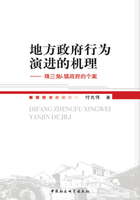
ABSTRACT
In China's market-oriented reform process, local government plays a vital role. However, local government-sponsored economic development also brings about social crisis, such as gap between the wealthy and poor, environmental pollution, group conflict, etc. Therefore, transformation of government function has become a focus of the whole society. In order to promote local government function shift, we first need to make sure: since the reform and opening up, what is the general trend about the change of Chinese local government behavior? What is the intrinsic mechanism of the transformation of the local government?
In order to answer the above questions, take on L town in Guangdong Province as an example, on the basis of the field investigation, this paper described in detail the basic trajectory of behavior change of L town since the reform and opening, and make a preliminary institutional interpretation about the internal mechanism of behavior change of L town from historical institutionalism perspective.
Three times of role transformation has been happened to L town during the past 30 year's market oriented reform.
In the early 1980s, with the implementation of state's policies of reform and opening, a series of policy of decentralization of power and transfer of profits, the enthusiasm of economic development of L town was fully aroused. Because goods was shortage, folk resources were lack, political environment is uncertain, market system is absent, L town Played a leading role of economic development. It actively founded collective enterprise, and developed three forms of OEM and compensation trades.
However, when the government-sponsored economic development encountered with buyer's market, the crisis also was appeared. In the mid 1990s, the collective enterprises founded by L town were early been over the hill, some were already in debt. Then, as the guidance of liberal market policy implemented by the State, L town Government was active in giving impetus to privatization reform, withdrawing from firm's microscopic operations. However, the state's economic incentive system remained as before, under the condition of the system of tax distribution, L town government has become a regional operator, carrying out largescale land development and investment promotion.
Since 21 century, regional operator took a new crisis when encountered with new market condition. High standard, large-scale infrastructural construction pushed up the cost of live and production in L town. But the quality of enterprise and worker was not improved proportionality, which exacerbated the risk of capital and labor flights because of the pressure of high cost. Under the impact of the international financial crisis, L town government began to carry out the enterprise upgrading strategies, migrant labor inclusion action, and social protection measures.
Scanning the three times of behavioral transformation of L town government from historical horizon, this paper argues that there are mainly four features about behavioral transformation of L town government.
1. The interaction between politics and market is the basic dynamic mechanism
The three times of behavioral transformation of L town government were happened because government-sponsored economic development faces a deep crisis when coming across new market condition, which forcing L town government change the pattern of government-sponsored economic development. Its basic skeleton is: executiveled-new market environment-crisis-the new executive-led-new market environment-new crisis -the new executive-led.
2. The reforming driving force comes from the state intervention and market restraint
The reforming twodriving forces of L town government's behaviors came from the state intervention and market restraint, which urged the reforming. The state urgeed the L town government's behaviors to have large scale reforming in shortterm by controlling Ideology, changing the rule of resource distribution and adjusting goal inspection. The structure change of commodity market, labor market and capital market, which directly influenced the L town government's economical behaviors. Sometimes, the restraint from market to L town government's behaviors is more effective than state.
3. Complicated as it seems, the main subject is economic growth
Since the reform and opening up, the L town government has experienced the role transformation process, which took the process from operating enterprises to manage the area, then management society. However, the basic goal of L town government's behaviors is local economic growth.
4. Crisis solution-oriented government transformation
The behavioral transformation of L town government was happened during settling the great crisis. Thus it is a form of Crisis solution-oriented government transformation, which contrasts to purposeful, planned and self-con-scious government transformation.
According to the theoretical context of local corporatism, this paper conceptualizes the new role manage society of L town government to new local corporatism. It forms a conceptual continuum with local corporatism by Oi and postlocal corporatism, which gives a new conceptual tool for understanding local government behavioral changes.